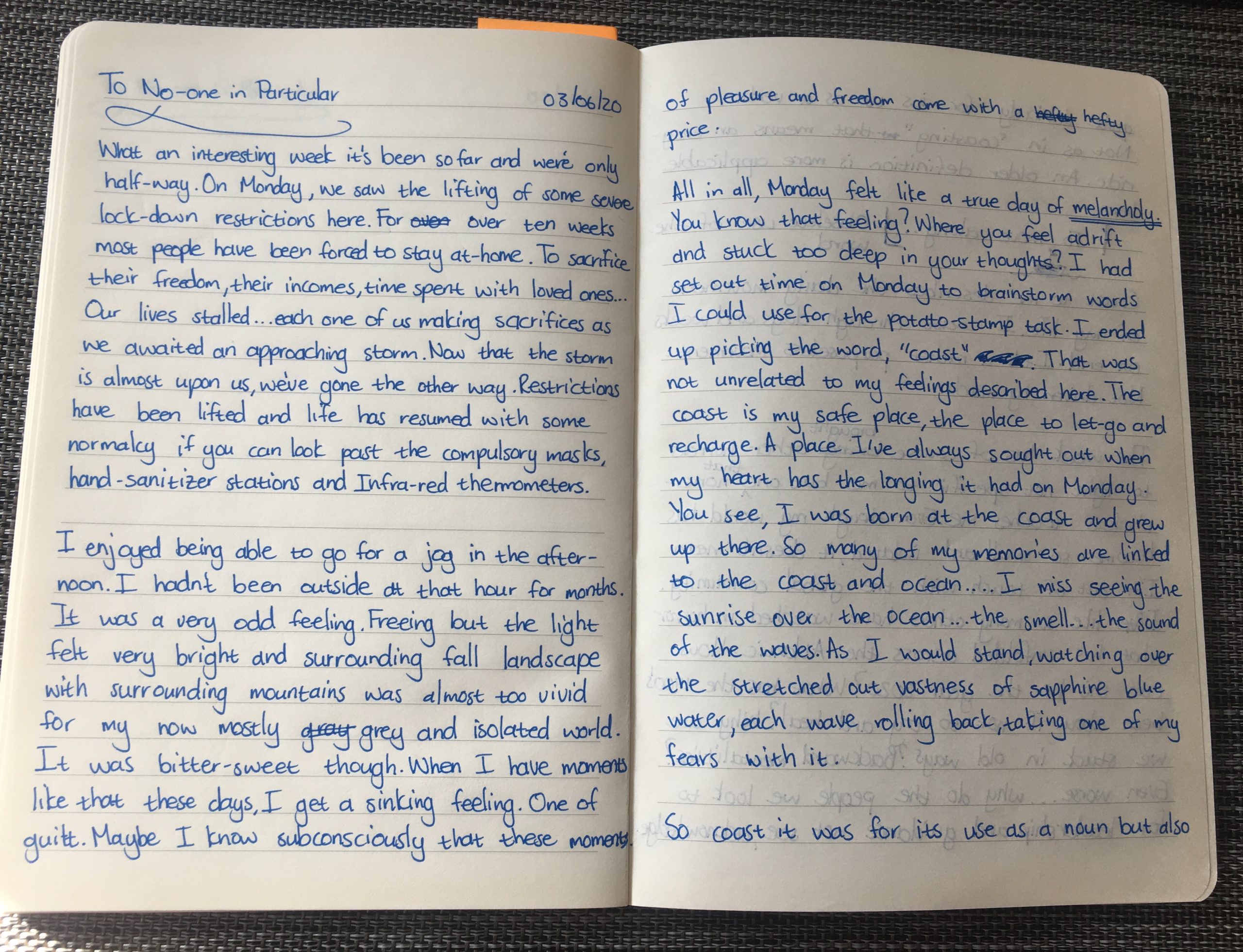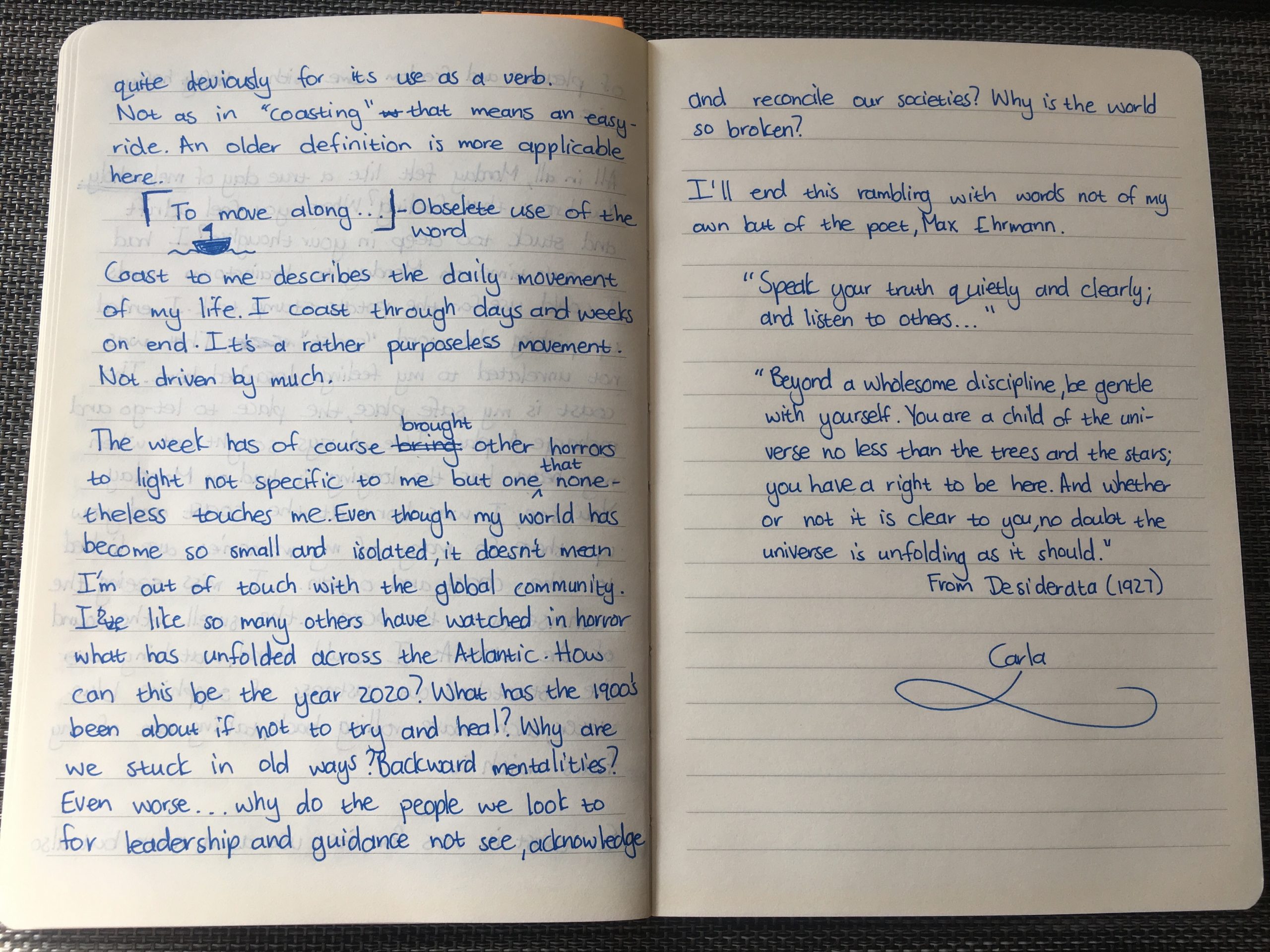

I made the choice to complete both options for Task 4 because I simply could not decide which one I would rather do. I am an old-school lover of written notes and right next to my laptop sits a notepad with a pen ready for any thought that I feel is so important that it requires a permanent commitment to paper. The task was thus not difficult in the sense of the mechanics required to produce the final product, as I am familiar with writing hand-written documents and favor this form of expression over typing on a word processor and printer.
To address some of the questions posed in this task though- when I make a mistake in written documents; I most often scratch it out by using two lines. This is a habit I picked up from my undergraduate years of study where we were prohibited from using correction fluid. I don’t find it bothersome and I now read over these blotches on the paper quite easily- I have no qualms over the resultant look of the document even though some might say it taints the document. I also don’t really care about how neat my hand-writing is. I used to write in cursive but as the need arose to write faster, I adapted to a style that allowed me to record thoughts at a quicker pace. Rather unconventional, at times, I also draw attention to certain parts of the text by underlining it or by including a small diagram. This is a habit I picked up from work where I often rely on diagrams to convey thoughts or ideas (I’m no Picasso but I think my diagrams get the job done).
However, the part of the task that was challenging was to decide on what I wanted to share with a larger audience. Very few of my written documents are shared with others and it felt a little intrusive to have to share my work with people I had barely met. Sharing the document, I felt would expose me and allow others to in effect spy on my inner thoughts and feelings. The podcast we listened to this week confirmed that these feelings were valid when the presenters succinctly summarized that writing lets us “be with each writer through their text”. Reading someone’s writing allows you to see and experience a world through their eyes or representation and thereby gives us an intimate view into their thoughts.
Writing by hand is definitely more personal to me though than using mechanized forms of writing. Apart from obvious cues such as how we write certain letters, underline words of importance or draw diagrams, I believe that even those mistakes documented in writing can give some insight into the thoughts of the person that wrote the text for e.g. I still struggle in deciding whether to write certain words in English as one or two words. My first language has a general tendency to write most words as one and in English, it is the opposite. My cheat (incorrect grammatically I think) is to use a hyphen between words like lock-down (should actually be one word) and hand-sanitizer (should be two words). Writing those words on a word processor would have allowed me to spot the errors and correct them before sharing my thoughts with the world as a printed document (a process that would have de-personalized the text). In conclusion, there is a personal touch to be witnessed in hand-written notes and letters that somehow can get lost when moving to print-based forms of writing.
Hi Carla,
I really enjoyed your thoughts and reflection on this assignment. It is amazing how personal writing can be, even if the topic is not necessarily one that is personal. There is something about how a piece of writing is written, the way the letters are formed, and the word choice that gives away information to the reader. As an elementary school teacher, I always talk to my students about their unique “voice” in their writing, and how I can distinguish between each students writing without even seeing a name. I find that this is especially revealing with manual script. I also enjoy how you add diagrams and a certain “character” to your writing, definitely making it unique to you.
In your reflection, you mentioned how in your undergrad studies correction fluid was prohibited. Was this specific to some courses or was this something that was blanketed across all of your courses? Personally, I also do not mind scratching out my errors, but I find it interesting that this would be a requirement. I know some people who live by correction fluid because they can’t stand seeing words scratched out on their pages, so I thought this was an interesting part of your reflection.
Kelvin